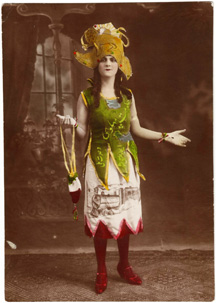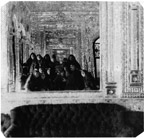All Restrictions End
 IRAN / 2009 / Persian / Color, B&W / Blu-ray (SD) / 35 min
IRAN / 2009 / Persian / Color, B&W / Blu-ray (SD) / 35 min
Director, Editing, Producer: Reza Haeri
Script: Sahand Abidi, Reza Haeri
Photography: Mostafa Ghaheri
Associate Producer: Bani Khoshnoudi (Pensée Sauvage Films)
World Sales: Arsenal—Institute for Film and Video Art
www.arsenal-berlin.de
A cinematic essay documenting the Iranian revolution and its coup d’état by reflecting on the politics of fashion, more particularly, the relevance of the latter to gender representation in modern Iran. Creating a collage of Persian painting, black-and-white photography, the first motion pictures filmed in Iran, classical cinema, and images of contemporary Iran, the filmmaker works in the manner of a tailor who cuts out and sews together fabric according to a pattern in order to create a single garment.
 [Director’s Statement] My generation’s childhood began with the revolution and the war and the rapid developments afterwards. However, nowhere has anyone explained to this generation the causes of these changes and developments. There was no opportunity for an explanation. Neither Father nor Mother nor teachers had a chance to understand past events. The revolution and the war happened too fast. The previous generation has even deliberately forgotten that they had once made a revolution.
[Director’s Statement] My generation’s childhood began with the revolution and the war and the rapid developments afterwards. However, nowhere has anyone explained to this generation the causes of these changes and developments. There was no opportunity for an explanation. Neither Father nor Mother nor teachers had a chance to understand past events. The revolution and the war happened too fast. The previous generation has even deliberately forgotten that they had once made a revolution.
This brings us back to the question of how we read images. Since the changes in clothes seem to be synchronized with the historical chasms that shaped Iran’s last 100 years, your observations of what people wear help you see what constitutes the image. They help you imagine the events in which the image is embedded.
 Reza Haeri
Reza Haeri
Reza Haeri is an Iranian filmmaker and producer of documentary and short films. He lives and writes in Tehran, where he is also involved with a local periodical. He is currently working on an independent film project. Some of his recent works are: Landfill Waltzing (2004), Imam Internet (2005), 127 An Iranian Band (2006), Final Fitting (2008), and FYI London Underground (2010). |
